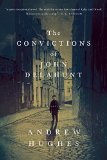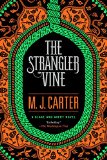Summary | Excerpt | Reading Guide | Reviews | Beyond the book | Read-Alikes | Genres & Themes | Author Bio

Charles Dickens' The Pickwick Papers was a Victorian publishing phenomenon. Originally envisioned as a series of short hunting and sporting tales to accompany Robert Seymour's engravings in a monthly magazine, the story soon took on a life of its own, with memorable characters such as Sam Weller and Mr. Pickwick himself capturing much of the world's imagination. It is common knowledge that the idea behind Pickwick was purely Dickens', but first-time novelist Stephen Jarvis believes that a conspiracy between Dickens and his publishers covered up two key facts: Pickwick was primarily Seymour's creation, and Dickens' brash attempt to take over the story was the impetus for Seymour's suicide in 1836.
Death and Mr. Pickwick seems like a fairly straightforward fictionalized account of Seymour's life. After the death of his father, a Somerset furniture-maker, his mother moves the family to London. Seymour intends to become a pastor, but soon abandons sermon practice for an apprenticeship with a draftsman. Jarvis posits that Seymour is a secret homosexual who lives with one of his fellow apprentices for a time, but later marries his cousin Jane to secure respectability. Seymour works feverishly at political caricatures and hunting sketches. When publishers Chapman & Hall approach him for some drawings for their new magazine, he expands on an idea he has long held to depict the comical adventures of a sporting club, presided over by the rotund Mr. Pickwick. "Pictures do sell words," Seymour insists.
Indeed, according to Jarvis, Pickwick was always meant to be driven by the illustrations, not the text. However, Dickens (known then by the nickname "Boz") is not happy with that arrangement. He wants free rein to take the storyline wherever he wishes – for instance, by introducing the character of a dying clown, whom Seymour reluctantly agrees to draw. Shortly after completing the artwork for the second issue, Seymour has a bitter argument with Dickens. And not long after that, Seymour shoots himself at an outbuilding behind his home. Chapman & Hall assume Seymour's suicide will mean the end for Pickwick, but Dickens convinces them to continue with new illustrators.
Put like this, the plot of the novel sounds like a simple recounting of historical facts and theories. Yet Jarvis adds in endless layers of complication by providing a through-line of background information about London's art scene and the real people and places that may have inspired Seymour's and Dickens' ideas for Pickwick. He gives full backstories for even the minor historical figures who enter the plot. Moreover, a modern-day framing story adds a metafictional aspect. "Mr. Inbelicate" has hired "Inscriptino," or "Scripty," as his secretary, to help correct historical errors in the text of The Pickwick Papers. These two characters take their names from printers' mistakes in the original text. Jarvis occasionally shifts to this present-day story to recount debates between Scripty and Inbelicate over the true origins of Pickwick and whether Dickens' misrepresentations about Seymour were deliberate.
At 800+ pages, this novel is chock-full of digressions – some amusing, others seemingly irrelevant. For instance, there is a 24-page interlude about the Grimaldis, famous father-and-son clowns who Dickens encountered as a boy; they may have been the inspiration behind the dying clown in Pickwick. Incidents are sometimes repeated from different perspectives, and there are many stories-within-stories. These can be tiresome for readers who just want to follow the central thread. More welcome are the occasional first-person accounts from minor characters, especially two from Seymour's male lover and Seymour's son, who – in a historical irony – also committed suicide. Jarvis' descriptions of unusual characters and holiday scenes feel so historically accurate they might merit the adjective "Dickensian" – were that not almost a dirty word in this novel's context.
Some specialist interest in Victorian illustration or the works of Dickens is helpful in keeping one going through such a long novel. Like Mr. Inbelicate, Jarvis started this project with the ambition of reading everything ever written about Pickwick, a massive undertaking given the "benign plague" of literary criticism that began with its publication and has continued ever since. The results are exhaustive…but also a little exhausting.
The digressive style here might be seen as a commentary on the nature of storytelling itself. Indeed, the novel has real-life mystery elements, but is more indebted to classic satires like Don Quixote and Tristram Shandy that play with the very idea that a life can be arranged into an orderly narrative. "It is the lie of novels to pretend that life has a plot," Jarvis slyly concludes. "The truth of life is in Pickwick: that one thing just follows another."
And did you know? Stephen Jarvis found Robert Seymour's grave!
Robert Seymour's gravestone was missing for over a century before Jarvis found it in a church crypt in 2010 and convinced the Dickens House Museum, London to display it in their backyard. See this Guardian news article for more details.
![]() This review was originally published in The BookBrowse Review in July 2015, and has been updated for the
June 2016 edition.
Click here to go to this issue.
This review was originally published in The BookBrowse Review in July 2015, and has been updated for the
June 2016 edition.
Click here to go to this issue.

If you liked Death and Mr. Pickwick, try these:

The Convictions of John Delahunt
by Andrew Hughes
Published 2016
Based on true events that convulsed Victorian Ireland, The Convictions of John Delahunt is the tragic tale of a man who betrays his family, his friends, his society and, ultimately, himself.

by Miranda J. Carter
Published 2016
Set in the untamed wilds of nineteenth-century colonial India, a dazzling historical thriller introducing an unforgettable investigative pair.
Your guide toexceptional books
BookBrowse seeks out and recommends the best in contemporary fiction and nonfiction—books that not only engage and entertain but also deepen our understanding of ourselves and the world around us.